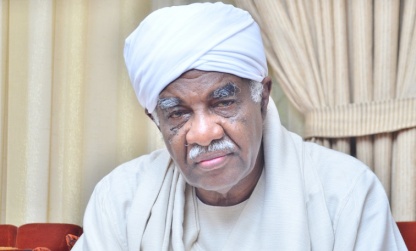Message to All Sudanese Men and Women For a United and Democratic Sudan

Dr. Ibrahim Al-Amin
Sudan and the Challenges of the Future Many countries, including Sudan, suffer from serious and complex crises. Some of these crises are imposed by “the transformations happening in the international community,” while others, particularly in our country, are of our own making—either intentionally or out of failure. The examples are numerous, and the most notable is the current debate about fundamental issues that have long been settled in most countries around the world. Our failure to address these issues reflects that we are operating with a mindset incapable of positively adapting to the unprecedented developments taking place in all fields of life.
In today’s world, the ability of a state to control the flow of ideas and information across its borders is gradually diminishing. Moreover, the strength of a state in contemporary societies is no longer measured by its land area, population size, military power, or natural resources. Instead, the strength and capability of a state are measured by its possession of information and its ability to access, utilize, and manage it efficiently and at the right time. The availability of information and the capacity to update, analyze, and interpret it is the fundamental element in making decisions and formulating public policies.
Therefore, any conversation about the state must be preceded by a discussion about society, which is the foundation. If reform is desired, it must begin with society so that the state, which is one of its tools, can be built on a solid and stable foundation, enabling it to fulfill its duties toward its people in a manner that is acceptable and open to criticism and change. Power struggles driven by self-interest or attempts to impose control over citizens and dictate their path through top-down directives are now outdated. This may have been effective in past centuries, but with the evolution of communication tools and the growing awareness of rights and interests, the issue has become clear in the minds of individuals and communities both at the national and global levels.
The issues of public freedoms, democracy, and human rights are no longer merely national concerns but have become international matters supported by strong and influential national and global public opinion. Experiences across the board have proven that the best governance systems are democratic ones, and the values of democracy have a universal character as they are deeply connected to human development. How can some reject democracy when it represents the values of freedom, justice, participation, equality, political and intellectual tolerance, acceptance of diversity, and peaceful transfer of power by the will of the people? It also ensures respect for human rights and the rule of law, among other principles.
How can we reject democracy when it is the best method for exercising power and organizing the relationship between the state and society through legal frameworks and political and institutional structures? Democracy is the best political system capable of guaranteeing the respect of human rights and possesses mechanisms for self-correction through allowing the people to regularly choose their rulers via free elections.



